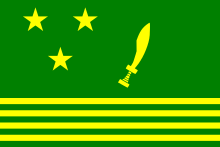Gorkha National Liberation Front
Gorkha National Liberation Front ( GNLF , Nepali गोर्खा राष्ट्रिय मुक्ति मोर्चा , "National Gurkha Liberation Front") is a small party in the Indian state of West Bengal .
Party history
The Gorkha National Liberation Front was founded on July 24, 1980 by Subash Ghising , a former member of the Gorkha Rifles , a regiment of the Indian army . It was founded during a troubled time in the Indian northeast . From 1979 to 1985 the Assam movement ( Assam movement ) agitated in the neighboring state of Assam , a mass movement initiated mainly by student organizations, which was directed primarily against massive illegal immigration across the green border from neighboring Bangladesh . Nonviolent means were not always used and there were numerous deaths due to ethnically and religiously motivated violence. The numerous small hill tribes in Assam and all of Northeast India were affected by this current and began to defend themselves against immigration from the lowlands or to fight for special rights.
The north of the Indian state of West Bengal, ie the Darjeeling district and the northern parts of the Jalpaiguri and Koch Bihar districts , was not populated by ethnic Bengali, but mainly by ethnic Nepalese. The declared goal of the Gorkha National Liberation Front was the creation of its own state " Gorkhaland " in the north of West Bengal. Nepalese should be recognized as an official state language of India and included in the constitution, and the Gorkhaland region should be better developed economically. The main political opponent was the left-front government of West Bengal under Chief Minister Jyoti Basu . After a lengthy phase of internal unrest and sometimes violent agitation, after two years of negotiations, the Darjeeling (Hill) Accord was concluded on August 22, 1988 , an agreement between representatives of the Indian central government under Rajiv Gandhi , the government of West Bengal and the leaders of the GNLF a regional council, the Darjeeling Gorkha Hill Council was formed as a regional self-governing body in the Darjeeling district. This regional council existed from 1988 to 2012. After this agreement, the Gorkhaland movement ebbed considerably. In the following all-India parliamentary elections in 1989 , the GNLF won the constituency of Darjeeling for the first and only time and sent a member of parliament to Lok Sabha . In the elections to the regional parliament in West Bengal in 1996, 2001 and 2006, the GNLF won 0.44%, 0.52% and 0.50% of the vote and 3 constituencies ( 22-Kalimpong , 23-Darjeeling , 24 -kursong ) respectively with very clear majorities. In 2007, the former comrade-in-arms of Subash Ghising, Bimal Gurung , founded the Gorkha Janmukti Morcha (GJM, "Gurkha People's Liberation Front"). The political weight of the GNLF has since declined sharply and the party could no longer win any constituencies in the 2011 election in West Bengal. It achieved less than 10% of the vote in the three constituencies mentioned, while the rival GJM received well over 50% in each case. In the 2016 election she did not run at all and on January 29, 2016, the founder and long-time party leader Subash Ghising died at the age of 78.
Individual evidence
- ↑ a b Sabyasachi Bandopadhyay: Subash Ghising: The leader who spearheaded the dream of Gorkhaland dies at 78. The New Indian Express, January 30, 2015, accessed September 2, 2016 .
- ↑ Amiya K. Samanta: Gorkhaland Movement: A Study in Ethnic Separatism. APH Publishing Corporation, New Delhi 2000, pp. 117ff PDF . ISBN 81-7648-166-1 .
- ^ Romit Bagchi: Gorkhaland: Crisis of Statehood. Sage Publications 2012. p. 462 . ISBN 8132107268 .
- ↑ Kamaljeet Rattan: Taste of peace: An accord is finally signed. indiatoday, August 15, 1988, accessed September 3, 2016 .
- ^ Election Results - Full Statistical Reports. Indian Election Commission, accessed on September 3, 2016 (English, election results of all Indian elections to the Lok Sabha and the parliaments of the states since independence).

